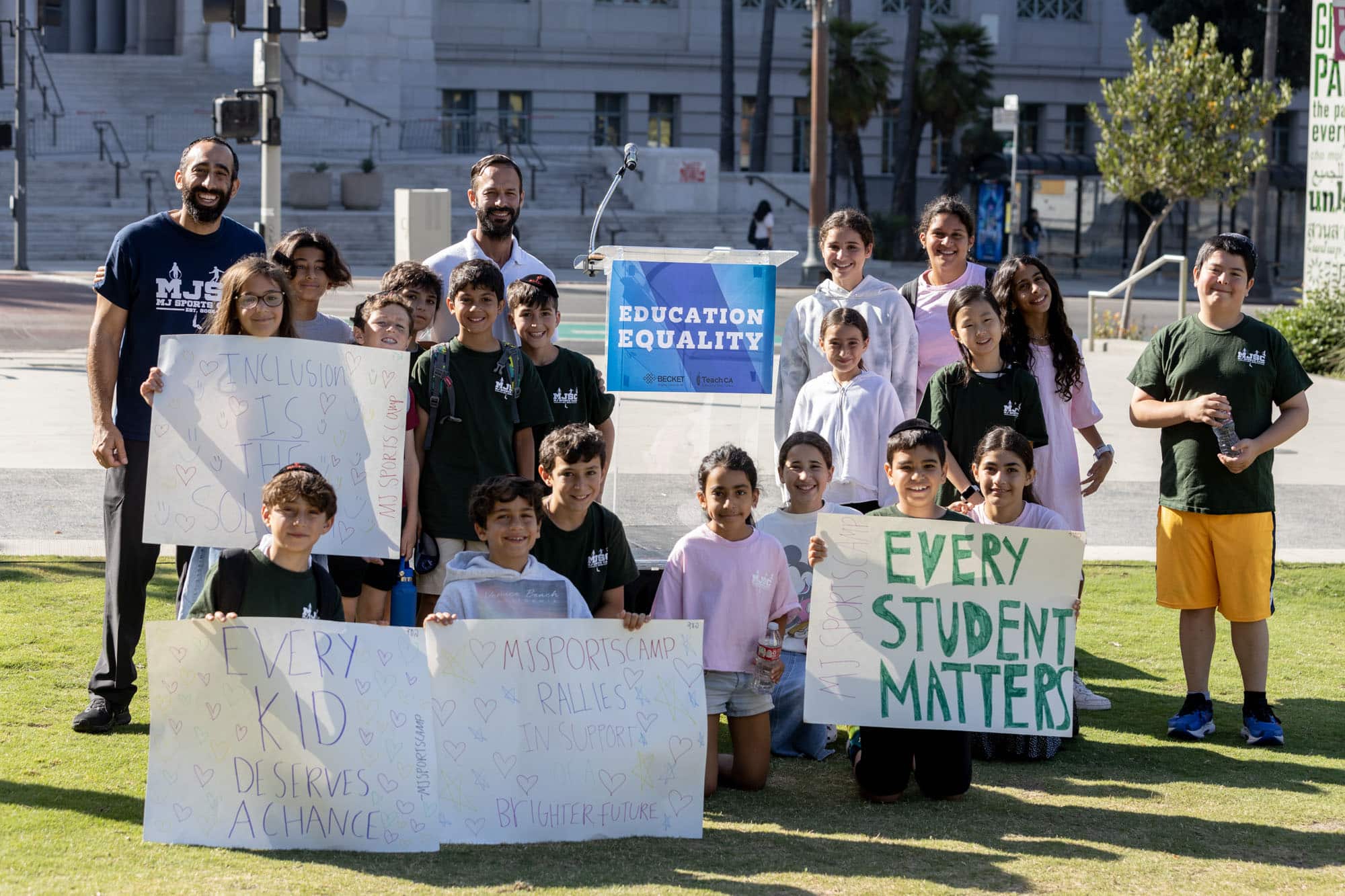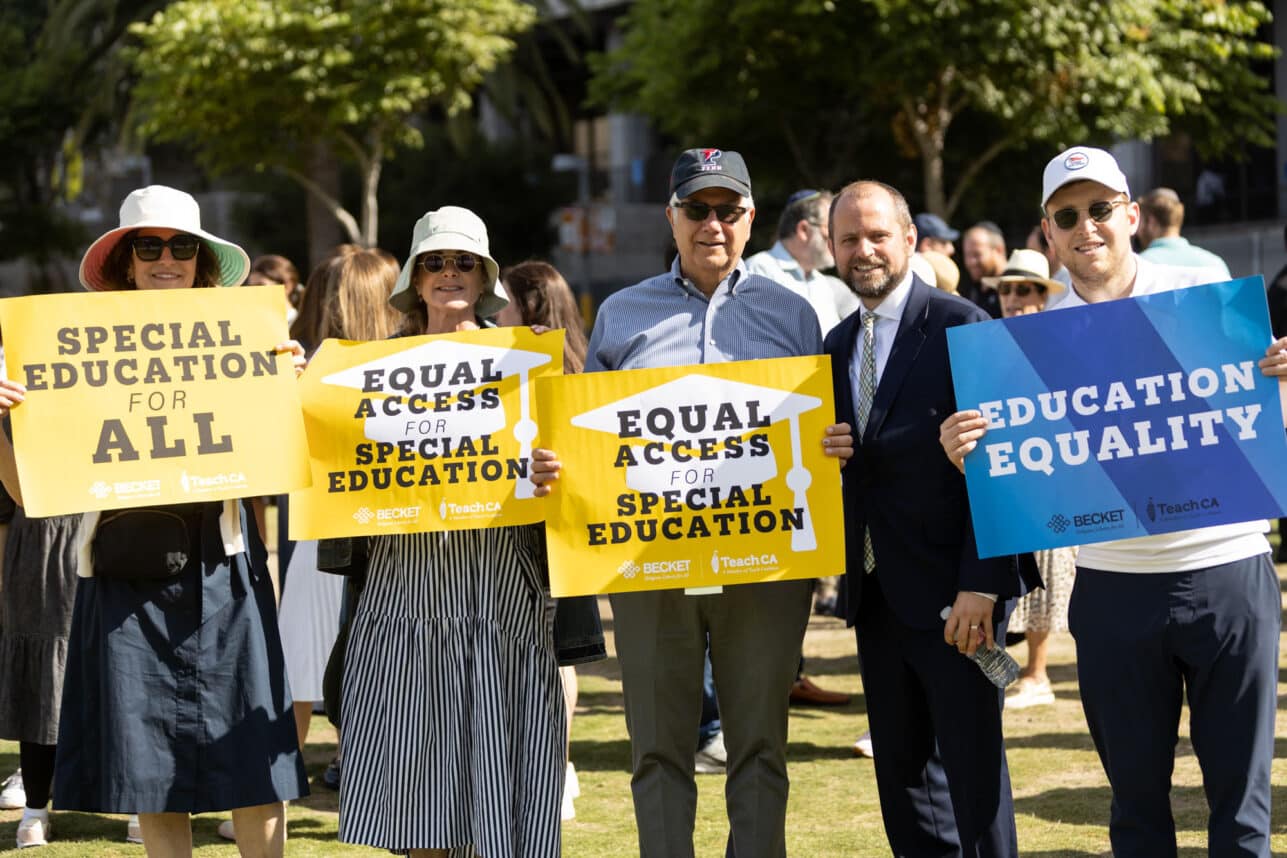 Courtesy of The Becket Fund for Religious Liberty
Courtesy of The Becket Fund for Religious Liberty A rally was held on the morning of July 21 before the first hearing on the Orthodox Jewish families and Jewish day schools’ lawsuit against the California state government, alleging that the state government is unconstitutionally barring federal funding for special needs services from Jewish day schools.
Under the federal Individuals with Disabilities Education Act (IDEA), public schools are required to provide funding for special needs students. But some public schools don’t have the infrastructure for that, in which case they make a referral to private schools that do. The families of special needs students then receive federal funding to attend those private schools. But the California state government has barred such funding from going to religious private schools, the issue at the heart of the current lawsuit, Loffman v. California Department of Education. The plaintiffs are Chaya and Yoni Loffman, Fedora Nick and Morris Taxon, and Sarah and Ariel Perets––all of whom are parents of special needs children––and Los Angeles Jewish day schools Shalhevet and Yavneh Hebrew Academy.
Around 200 people attended the rally, which was held at the Gloria Molina Grand Park lawn across from City Hall and featured various speakers decrying the actions of the California state government. Teach Coalition Founder Maury Litwack kicked off the rally by highlighting the “unimaginable situation” of the parents who are filing the lawsuit. “Their desire is a simple one: to send their children with special needs to a school, yeshiva, that will give them the tools necessary to flourish, but also with an education set in a Jewish environment,” Litwack said. “But despite that simple need … the state of California has refused them help because the state of California and their elected officials have decided that these children, and thousands like them, are not eligible for special education funding simply because their parents value a religious education.”
Litwack lambasted the California policy as being “outrageous” and “unfair.” “The courts and places like the Supreme Court have already declared that religious schools and their parents cannot be discriminated in this manner,” Litwack said. “It’s unconstitutional … what California’s doing stands against this. All children with disabilities regardless of their religious beliefs should have the same opportunity to receive a quality education that meets their unique needs. And a parent should never, never have to compromise on how or where their child’s educated. So today, here, all together, we’re gonna change that.”
The first parent in the lawsuit to speak was Chaya Loffman, a mother of two. “Like every parent, I want to raise my children with all the care and support that they need to thrive,” Loffman said. “Unfortunately, California is making it harder for me to provide that to my child with disabilities simply because of our faith. Politicians in this state are using religion as an excuse to deny my son and countless other children a safe and supported learning environment that meets all their needs. No parent should have to choose between raising their child in faith and providing their child with the tools that they need to reach their full potential.” She prayed for the court “to allow my son to receive the supportive, religious, and education environment that he needs to flourish.”
The other parent in the lawsuit to speak was Fedora Nick. Her two oldest sons were able to receive a Jewish education, but her youngest was not due to being diagnosed with autism. “In California, our elected representatives refuse to help children with disabilities attend schools that reflect their religious backgrounds,” she said. “Because the state bars religious schools from its program providing support services to children with disabilities, my husband and I have been unable to send our son to a school where he can reach his full potential, educational and spiritual.”
One of Nick’s sons, Asher Taxon, proceeded to tell attendees he is “saddened” that his younger brother, who has autism, has been denied the same education that Taxon received at Jewish schools. “Kids like him have to overcome obstacles and challenges to have their unique needs met in the classroom and our state politicians are making that even harder,” Taxon said. “Instead of putting more barriers in front of these kids with disabilities, California should be doing everything it can to ensure that safe, supportive and compassionate learning environments are available to all.”

Miriam Marks, who is a parent of a special needs child but is not one of the plaintiffs, told rally attendees: “When you are the parent of a special needs child, every day is a battle. A fight for something your child needs. Every day brings something new, something you could not have anticipated or planned for.” She explained that her son, Yonatan, has received new opportunities thanks to various therapies and treatments. “Today, I stand in front of you with a deep understanding of the importance of what the right special needs support can do for a child,” Marks said. “And even more so, what having that support and access––wherever a parent feels is best for their child, especially in their school of choice––could mean. An opportunity we wish we could have had with Yonatan.”
Other speakers were from Jewish day schools. Rabbi Yoel Burstyn, principal of Bais Yaakov Los Angeles, recounted how Martin Luther King Jr. decided “to try the impossible and accomplished the incredible.” “He fought discrimination. He fought segregation. People didn’t believe he would be able to accomplish what he accomplished,” Burstyn said. “But he wouldn’t relent and he succeeded. We here today are doing the exact same thing: we are fighting discrimination. We taxpayers––who pay our taxes––all we’re asking for is give us back our money. We pay our taxes, and we deserve to get the services that we paid for.” Burstyn proceeded to give a message to state politicians. “We don’t want to take you to court. We don’t want to fight you to court. We should be on the same side,” he said. “We’re all fighting for these children who can’t stand up for themselves. Open your hearts and open your mind and understand, we need you and you can do it.” Burstyn later added: “You believe in people’s right to choose. Where is our right to choose if we can’t get what’s rightfully ours?”
Yavneh Academy Dean Rabbi Shlomo Einhorn also spoke at the rally, expressing Yavenh’s desire “to provide every child that comes to our school an Orthodox education that allows and enables them to flourish. According to California, however, we should not be able to help students with disabilities.” He lamented that “shining a lot” on the issue wasn’t enough for the state government to change course. “For the congresspeople in Sacramento, it’s politics before children,” Einhorn said. “I hope and I pray that the court will right this injustice and allow all students to flourish at Yavneh and other private religious institutions across the state.”
Video courtesy of The Becket Fund for Religious Liberty
After the rally concluded, some headed over to the courthouse for the case’s oral arguments, with the state arguing to dismiss the case and the plaintiffs arguing for a preliminary injunction. Nick Reaves, one of the attorneys from The Becket Fund for Religious Liberty that is representing the plaintiffs, told the Journal that he thought “the hearing went well.” “The court was asking both sides some challenging questions, but I think we explained to her that this was a really important issue. I think one way we did that was by having the whole community show up.” Reaves pointed to the rally as well as the fact that 40 or 50 families showed up in the courtroom for support for the plaintiffs. He expects that it could take “several weeks if not several months” for the court render a decision.
“We’re looking forward to the next steps in this case,” Reaves said. “This is not gonna be a single hearing, there’s gonna be multiple opportunities to explain to the court why these Orthodox Jewish families and schools have the same rights as other families who choose to send their kids to a secular school.”
The Loffman parents said in a statement to the Journal following the hearing: “We want to educate our son in a safe, supportive learning environment that meets his unique needs and upholds our shared religious beliefs. Unfortunately, California is forcing our family to choose between raising our son in our faith tradition and providing him the help he needs to reach his full potential.”
Teach Coalition Founder Maury Litwack also said in a statement to the Journal regarding the hearing, “All children with disabilities, regardless of their religious beliefs, should have the same opportunity to receive a quality education that meets their unique needs—and a parent should never have to compromise on how or where their child is educated.”
“We’re looking forward to continuing engagement with community,” Reaves said. “The community’s support is really what allows us to do this litigation.”
This article has been updated.























 More news and opinions than at a Shabbat dinner, right in your inbox.
More news and opinions than at a Shabbat dinner, right in your inbox.